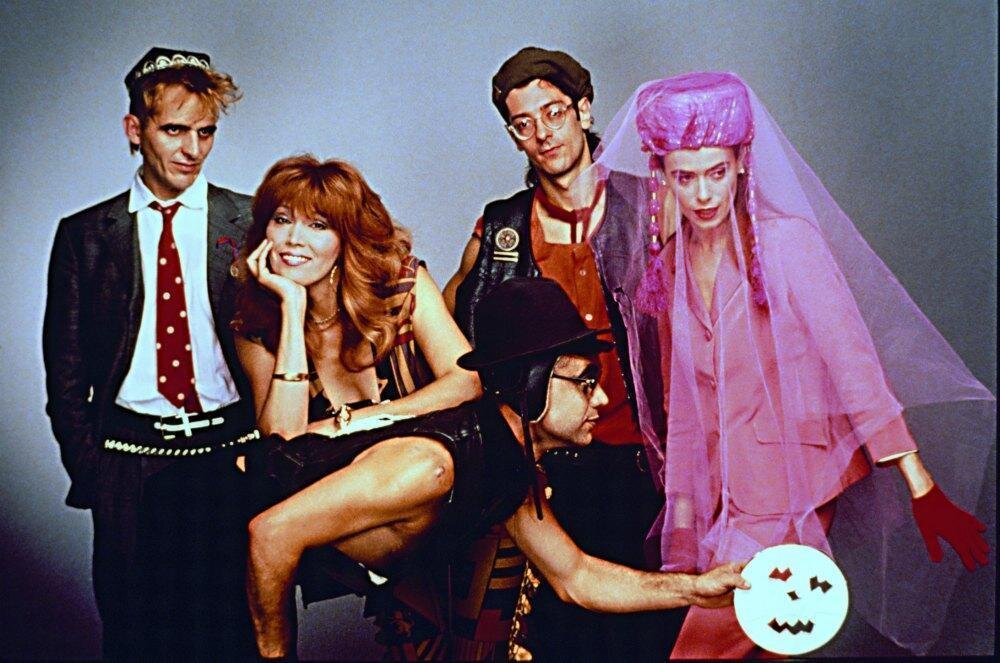Produci, Consuma, Crepa: The Relevance of CCCP-Fedeli alla Linea in 2020
During my first month in Milan, I spent some time wandering aimlessly around the city and I couldn't help but notice the dozens of bright red posters advertising the new collaboration between CCCP- Fedeli alla Linea, a legendary Italian punk rock band, and Slam Jam, one of Milan’s most famous fashion distributors. The collaboration is surely an interesting one, since many apparent contradictions that might appear to the untrained eye. However, what I am personally interested in, is the fact that this will surely expose the band to a new, and maybe even international audience. Therefore, the question worth asking would be: Is CCCP - Fedeli alla Linea a band worth listening to in 2020?
Illustration via @slamjammilano
“Io sto bene / Io sto male / Io non so dove stare / Io non so cosa fare”
Founded in 1982 and disbanded in 1990, CCCP - Fedeli alla Linea defined themselves as “melodic music from Emilia-Romagna” and “pro-soviet punk”. This is due to the fact that they ( without irony) adopted various elements of the communist-punk counterculture of the 80s– their name is the Russian equivalent of the USSR, and their debut’s title and album cover reference the founder of the Italian Communist Party. Because of this, CCCP - Fedeli alla Linea are often shrugged off as a “ radical communist punk band”, while their music goes way beyond to what their appearance would lead one to believe. Their approach to punk is unique; a mixture inspired by classical punk, Arab music, Italian folk and Catholic church chants. Their songs often take on loose structures with particularly interesting guitar work and experimental production choices. Giovanni Lindo Ferretti’s lyrics are, both in content and delivery, unique, ranging from aggressively repeated single words, to witty and poetic verses.
This band is one of my all-time favourite Italian musical acts, and in this piece I would like to show how their music and their message can be as relevant today as it was in the 80s. I will be focusing on exemplary songs from their groundbreaking debut album, and personal favorite of mine: “1964-1985 Affinità-Divergenze Fra il Compagno Togliatti e Noi - Del Conseguimento Della Maggiore Età”( 1964/1985 Affinities-Divergences Between Comrade Togliatti and Us – Of The Coming of Age)
Arguably their most iconic song, Io Sto Bene (I Am Well) is a reflection of the inherent lack of meaning of the everyday (post)modern life and its consequences. The lyrics “Non studio / Non lavoro / Non guardo la TV / Non vado al cinema / Non faccio sport” ( “I don’t study / I don’t work / I don’t watch TV / I don’t go to the movies / I don’t work out”) and “Io sto bene / Io sto male / Io non so dove stare / Io non so cosa fare” (“I am well / I am unwell / I don’t know where to be / I don’t know what to do”) reflect a state of restless uncertainty and indecision. The ecstatic whirlwind of entertainment and options puts the singer in an almost nihilistic state, leaving him with no will to engage in any activity, and uncertain about his own feelings and desires. This is, in my opinion, one of the best musical depictions of modern melancholia and an everlasting anthem for all of those who sometimes feel lost in the meaninglessness of it all.
CCCP - Fedeli alla Linea
Valium Tavor Serenase is a perfect example of CCCP’s unique combination of hardcore punk and traditional Italian folk music. The song starts off with hammering drums and Canali’s signature distorted guitar chords, as Giovanni Lindo Ferretti sings about addiction to pharmaceuticals: “Il Valium mi rilassa / Il Serenase mi distende / Il Tavor mi riprende / C’è chi mi da energia e chi la porta via” (Valium relaxes me / Serenase distends me / Tavor picks me up / There’s who gives me energy and who takes it away”). The next lines are poignant questions such as, “Perché vi batte il cuore? / Per chi vi batte il cuore?” (“What makes your heart beat? / Who makes your heart beat?) and “Meglio un medicinale o una storia infernale?” / “Meglio giornate inerti o avere i capelli verdi?” (“Is it better to take medicine or to live a hellish relationship?” / “Is it better to live inert days or having green hair?”). Is a change of look really going to make your days more meaningful? Or is it just another way of coping with life?
The song then briefly transitions into a traditional canzone from Emilia-Romagna, offering a brief look into the “old good times”. Back to when modernity was still far away, a perfect example of the group’s versatility and original approach to music, which is all packed in just 1 minute and 18 seconds!
My personal favorite, Morire (“To Die”) starts off with a calming bass and guitar lines as Giovanni Lindo Ferretti’s echoing voice recites the lines: “Esiste una sconfitta pari al venire corroso / Che non ho scelto io ma è dell'epoca in cui vivo / La morte è insopportabile per chi non riesce a vivere / La morte è insopportabile per chi non deve vivere” ( “There is a defeat equal to being corroded / That i haven’t chosen but it’s of the time that i’m living / Dying is unbearable for those unable to live / Dying is unbearable for those who don’t have to live”) touching again on the hardships of (post)modern life and the radical manque à être that permeates it. The song then transitions to full-on punk, as the pace of the drumbeat increases and the lyrics become more aggressive, repeating the imperatives “Produci / Consuma / Crepa” (“Produce / Consume / Die”) .
“Produci / Consuma / Crepa”


